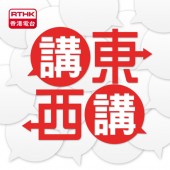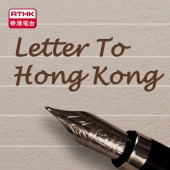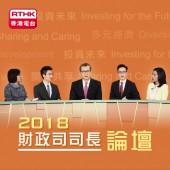 載入中 ...
載入中 ...
返回
Legislator Charles Mok
2019-03-10
Just about three weeks ago, on February 18, the Outline Development Plan for the Guangdong-Hong Kong-Macao Greater Bay Area was released by the Chinese central government, followed by the announcement of the annual budget of the Hong Kong Special Administrative Region government, on February 27. The two announcements shared the theme of developing a new economy based on innovation and technology, with Hong Kong playing the role of not only a center for financial services but also technology research and development.
Of course, our government’s emphasis on innovation and technology in its policies and strategies is nothing new. In the last several years, over 100 billion Hong Kong dollars have been earmarked for innovation and technology development — with especially large investments in infrastructure and R&D. I have argued that our government needs to do more with local market development and manpower re-development, in addition to better education and updating outdated laws and regulations.
But with the GBA plan’s revelation that the central government’s priorities for Hong Kong are clearly about taking advantage of our academic and research capabilities, and attracting our professionals to work in the mainland, I begin to wonder, are these policies purely for serving the national interest, in Beijing’s view, rather than in Hong Kong’s best interest.
That was why I question the Chief Executive soon after the GBA plan’s announcement in Legco’s Q&A session on whether initiatives under the GBA plan would take absolute priority in our government’s future policy formulation, ahead of other initiatives that might be more beneficial to Hong Kong ourselves. Unfortunately, the CE did not directly answer my question.
So, it is not surprising that many of our citizens are asking, is Hong Kong going to just become another Chinese city in a so-called “region” in China that aspires to become bigger and better and richer than Silicon Valley, or, is Hong Kong still going to compete with the top economic cities in the world. By shifting too much effort internally in to the Mainland, is this transformation going to come at the expense of Hong Kong’s international standing?
Then, on February 27, actually on the same day our Financial Secretary made his budget speech, United States Consul General Kurt Tong also made remarks about Hong Kong, defining his country’s vision for our city’s role in the Asian economy, or Indo-Pacific economy as he put it. In his remarks, he sounded cautions about a few risks facing Hong Kong’s economic and political future, thus drawing criticism from the pro-Beijing camps. According to reports, the Consulate General passed out copies of Mr Tong’s speech to protesters who showed up on Garden Road. Surely it would be good to know what you are protesting against. And, there is always Google Translate for those who need it.
In his speech, Mr Tong first defined the US’s four objectives for this region — openness, freedom, transparency, and fairness. Openness maximizes opportunities for entrepreneurs, investors, workers and consumers. A free regional platform allows for trade and investment with fewest barriers. Transparency ensures minimal corruption and arbitrary regulations, ensuring trust, confidence and competition. And fairness means a level playing field for honest competition and not government manipulation.
These may not be values shared by Beijing, but I would imagine our government and our business sector, being so proud of our ranking as the world’s freest economy for 25 consecutive years by the Heritage Foundation, should wholeheartedly agree.
Mr Tong actually also praised Hong Kong for what he called our “fierce embrace” of free economy principles, and our rule of law and independent judiciary, calling us a highly valued partner of his country. He also acknowledged the extensive government-to-government cooperation in areas such as disrupting the flow of contraband, counterfeit goods, narcotics and illegal fund transfers. He also said the two governments have redoubled joint efforts on enforcements of international sanctions and export controls.
He also suggested Hong Kong to continue to enter into more regional trade agreements, as our government had done with ASEAN, Australia and so on in recent years. This is exactly what we the Professionals Guild have been advocating more effort from Hong Kong to join the Comprehensive and Progressive Agreement for Trans-Pacific Partnership, or, CPTPP.
Mr Tong went on to say that Hong Kong has maintained a high degree of autonomy under the “one country, two systems” framework — but that was only so “in most areas.” He described a number of “unfortunate firsts” for Hong Kong in last year — our government’s first banning of a political party, the first foreign journalist ejected, the first series of disqualifications of a large number of political candidates because of their political views, with all of these cases apparently having intimate involvement by the mainland central government.
In the past months, I have repeatedly heard from the technology and business sectors of their worries about these developments. The recent letter from the American Chamber of Commerce in Hong Kong to the Security Bureau, stating their “grave concerns” for the proposed extradition agreement with the Mainland, Taiwan and Macau, is an obvious example. In their words, the mainland’s “criminal process is plagued by deep flaws, including lack of an independent judiciary, arbitrary detention, lack of fair public trial, lack of access to legal representation and poor prison conditions,” as opposed to “Hong Kong’s strong rule of law and judicial independence” that attracted international businesses and capitals to come and stay. Indeed, our own local business sector shares the same worries, even though they have not stated the obvious reasons so obviously.
But I would like to point out one other point that the media has not widely reported. In the speech, freedom of the Internet and its freedom of expression are said to be critical to realize Hong Kong’s “positive ambition to be an important center for innovation in information technology and cyberspace.” This kind of freedom is something that one cannot easily say for most other parts of Asia. It is among our greatest advantages. Yet, with the proposed integration with the Greater Bay Area, will we be moving in the wrong direction, toward more government control of Internet contents and even censorship?
Our trading allies clearly support Hong Kong as having a better economic, legal and social system than the Mainland. That is as clear an affirmation of our “one-country, two-systems” framework as one can get. It would be good for Hong Kong to listen to the voices of reasons and concerns from our trading allies. In contrast, when our own Financial Secretary was asked in a recent TV interview about the unlikely event of the US’s revocation of our independent economic status in tariff and trade, he only said un-ambitiously : “we will survive”. We ought to do better than just surviving as just another Chinese city. The world deserves us as an innovative international city to the highest global standard. So do the people of Hong Kong.
Of course, our government’s emphasis on innovation and technology in its policies and strategies is nothing new. In the last several years, over 100 billion Hong Kong dollars have been earmarked for innovation and technology development — with especially large investments in infrastructure and R&D. I have argued that our government needs to do more with local market development and manpower re-development, in addition to better education and updating outdated laws and regulations.
But with the GBA plan’s revelation that the central government’s priorities for Hong Kong are clearly about taking advantage of our academic and research capabilities, and attracting our professionals to work in the mainland, I begin to wonder, are these policies purely for serving the national interest, in Beijing’s view, rather than in Hong Kong’s best interest.
That was why I question the Chief Executive soon after the GBA plan’s announcement in Legco’s Q&A session on whether initiatives under the GBA plan would take absolute priority in our government’s future policy formulation, ahead of other initiatives that might be more beneficial to Hong Kong ourselves. Unfortunately, the CE did not directly answer my question.
So, it is not surprising that many of our citizens are asking, is Hong Kong going to just become another Chinese city in a so-called “region” in China that aspires to become bigger and better and richer than Silicon Valley, or, is Hong Kong still going to compete with the top economic cities in the world. By shifting too much effort internally in to the Mainland, is this transformation going to come at the expense of Hong Kong’s international standing?
Then, on February 27, actually on the same day our Financial Secretary made his budget speech, United States Consul General Kurt Tong also made remarks about Hong Kong, defining his country’s vision for our city’s role in the Asian economy, or Indo-Pacific economy as he put it. In his remarks, he sounded cautions about a few risks facing Hong Kong’s economic and political future, thus drawing criticism from the pro-Beijing camps. According to reports, the Consulate General passed out copies of Mr Tong’s speech to protesters who showed up on Garden Road. Surely it would be good to know what you are protesting against. And, there is always Google Translate for those who need it.
In his speech, Mr Tong first defined the US’s four objectives for this region — openness, freedom, transparency, and fairness. Openness maximizes opportunities for entrepreneurs, investors, workers and consumers. A free regional platform allows for trade and investment with fewest barriers. Transparency ensures minimal corruption and arbitrary regulations, ensuring trust, confidence and competition. And fairness means a level playing field for honest competition and not government manipulation.
These may not be values shared by Beijing, but I would imagine our government and our business sector, being so proud of our ranking as the world’s freest economy for 25 consecutive years by the Heritage Foundation, should wholeheartedly agree.
Mr Tong actually also praised Hong Kong for what he called our “fierce embrace” of free economy principles, and our rule of law and independent judiciary, calling us a highly valued partner of his country. He also acknowledged the extensive government-to-government cooperation in areas such as disrupting the flow of contraband, counterfeit goods, narcotics and illegal fund transfers. He also said the two governments have redoubled joint efforts on enforcements of international sanctions and export controls.
He also suggested Hong Kong to continue to enter into more regional trade agreements, as our government had done with ASEAN, Australia and so on in recent years. This is exactly what we the Professionals Guild have been advocating more effort from Hong Kong to join the Comprehensive and Progressive Agreement for Trans-Pacific Partnership, or, CPTPP.
Mr Tong went on to say that Hong Kong has maintained a high degree of autonomy under the “one country, two systems” framework — but that was only so “in most areas.” He described a number of “unfortunate firsts” for Hong Kong in last year — our government’s first banning of a political party, the first foreign journalist ejected, the first series of disqualifications of a large number of political candidates because of their political views, with all of these cases apparently having intimate involvement by the mainland central government.
In the past months, I have repeatedly heard from the technology and business sectors of their worries about these developments. The recent letter from the American Chamber of Commerce in Hong Kong to the Security Bureau, stating their “grave concerns” for the proposed extradition agreement with the Mainland, Taiwan and Macau, is an obvious example. In their words, the mainland’s “criminal process is plagued by deep flaws, including lack of an independent judiciary, arbitrary detention, lack of fair public trial, lack of access to legal representation and poor prison conditions,” as opposed to “Hong Kong’s strong rule of law and judicial independence” that attracted international businesses and capitals to come and stay. Indeed, our own local business sector shares the same worries, even though they have not stated the obvious reasons so obviously.
But I would like to point out one other point that the media has not widely reported. In the speech, freedom of the Internet and its freedom of expression are said to be critical to realize Hong Kong’s “positive ambition to be an important center for innovation in information technology and cyberspace.” This kind of freedom is something that one cannot easily say for most other parts of Asia. It is among our greatest advantages. Yet, with the proposed integration with the Greater Bay Area, will we be moving in the wrong direction, toward more government control of Internet contents and even censorship?
Our trading allies clearly support Hong Kong as having a better economic, legal and social system than the Mainland. That is as clear an affirmation of our “one-country, two-systems” framework as one can get. It would be good for Hong Kong to listen to the voices of reasons and concerns from our trading allies. In contrast, when our own Financial Secretary was asked in a recent TV interview about the unlikely event of the US’s revocation of our independent economic status in tariff and trade, he only said un-ambitiously : “we will survive”. We ought to do better than just surviving as just another Chinese city. The world deserves us as an innovative international city to the highest global standard. So do the people of Hong Kong.
Politicians and public figures from a range of backgrounds take turns to have their say on important matters of the day in this personal view programme.
Catch it live: Sunday 8:15am - 8:25am
Podcast: Updated weekly and available after broadcast.










